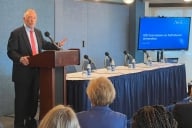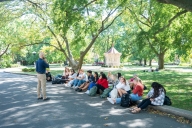You have /5 articles left.
Sign up for a free account or log in.
Social justice matters get a fair amount of attention at colleges these days, often in the form of service learning or extracurricular activities. But at one Roman Catholic liberal arts college near Philadelphia, the very core of a new curriculum foregrounds the fact that justice does matter.
Cabrini College's “Justice Matters" core curriculum will feature as a cornerstone a required course sequence termed "Engagements with the Common Good" -- which will include three writing-intensive courses, one each from the freshman through junior years, plus a senior capstone experience in the major.
Now being piloted and to be required of all incoming students starting this fall, ECG 100, 200 and 300 focus, respectively, on awareness of a student’s position and connections relative to groups, communities, and cultural, political and economic contexts; on participation through service learning with a partnering community organization; and on enacting social change through community-based research projects or legislative and advocacy work. EGC sections will vary in content based on faculty interest and expertise, but each level of the sequence has a common set of learning goals associated with it.
“From self to other, the wider community – then how do you take action or put research into use, lobbying or doing legislative change,” Nancy Watterson, an assistant professor of social justice and American studies, said in describing the sequence.
"Not that I want to marginalize this, but not having it just be clocking service hours," said Marie Angelella George, Cabrini's president, in describing the goals for the new "mission-driven" curriculum. "But that it really allows students to think critically about what they’re experiencing outside the classroom and develop a lens that supplements their critical thinking skills -- a lens of seeing, observing, hearing issues and becoming a student. Maybe identifying what are the underlying systemic issues in the situation I’m seeing in front of me, whether that’s global or local hunger, whether it’s poor water filtration at a nearby creek that’s running in my neighborhood.”
The Engagements with the Common Good sequence replaces what had been a long-standing, one-course service learning requirement for juniors. “We were probably one of the very first schools to require service learning and community involvement,” said Jerry Zurek, a professor of communication and department chair. “We would get them interested in social justice and out in the community and then they would become seniors. It was very clear that one course out of the whole college career is not going to have a particularly profound effect for most students.”
Zurek taught a pilot ECG 100 course this fall, “Our Interdependent World,” for freshmen communications majors. Students did their final projects on fair trade and immigration reform. Among the course goals articulated in the syllabus: “You will learn how you, as Communication majors, can give voice to the voiceless around the world.”
“Not all the [ECG] courses are connected to the major, but I wanted this one to be. My feeling is that students need to see how their future profession can affect the common good,” said Zurek.
“My feeling has always been that teaching about justice is not enough and that service learning is not enough, and that we need to move beyond what colleges have grown comfortable doing and actually set our goals almost at an impossible level to change students’ lives long-term after they graduate. So that’s really the assessment that I’m going to be looking at -- 10 years from now, will students be actively involved in making the world better in terms of changing unfair and unjust structures of the world?"
Of course, college officials are also considering other, more immediate ways to assess the new curriculum -- although, says Charlie McCormick, dean of academic affairs, “We haven’t finalized a system at this point.”
"Doing good assessment of this sort of work, if there is a model out there for it, I haven't been able to identify it yet. I don't mean me but I mean all of us here at the college," McCormick said. “We’re testing different things. We’ve looked at the Defining Issues Test, which looks at moral reasoning; we’ve looked at empathy assessments. We’re not completely pleased with any of those."
McCormick added that some faculty are using e-portfolios. “But even if we use those we haven’t exactly figured out what’s the appropriate rubric to evaluate the project and student learning.”
He added, however: “What we found in the pilot group is that all those traditional liberal learning outcomes that are so important to a place like Cabrini College, students are better able to achieve those when we use those in the service of these justice issues. Critical thinking becomes real and important. Writing becomes something that you don’t just do for your professor but something you do for a wider audience and it matters in a way it doesn’t before."
In addition to the new ECG sequence, Cabrini’s Justice Matters core also features more conventional "Literacies in the 21st Century" requirements, including quantitative and scientific literacies.
“It was definitely a nice change of pace. It was kind of refreshing learning something that has relevance now, that can help people now," Ross Salese, a freshman communication major from New Jersey, said about the ECG pilot course he took with Zurek last fall. Salese added that he thinks requiring the course sequence is a good thing, although "some people might not be that into it, some people will be."
"For most of these issues that we talked about, if I didn’t know about them, I wouldn’t do anything about it," Salese said. "If they make it a mandatory course, at least people are more educated about the subject. They may choose to help or not, but at least they’re educated."








